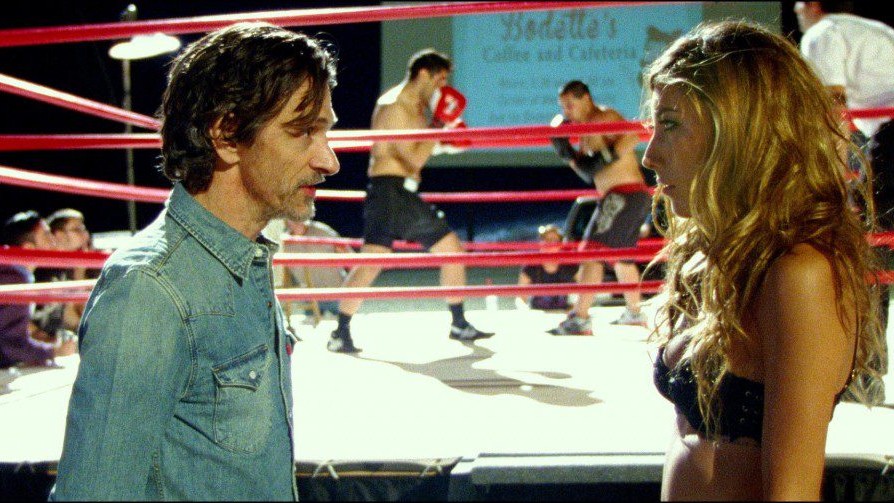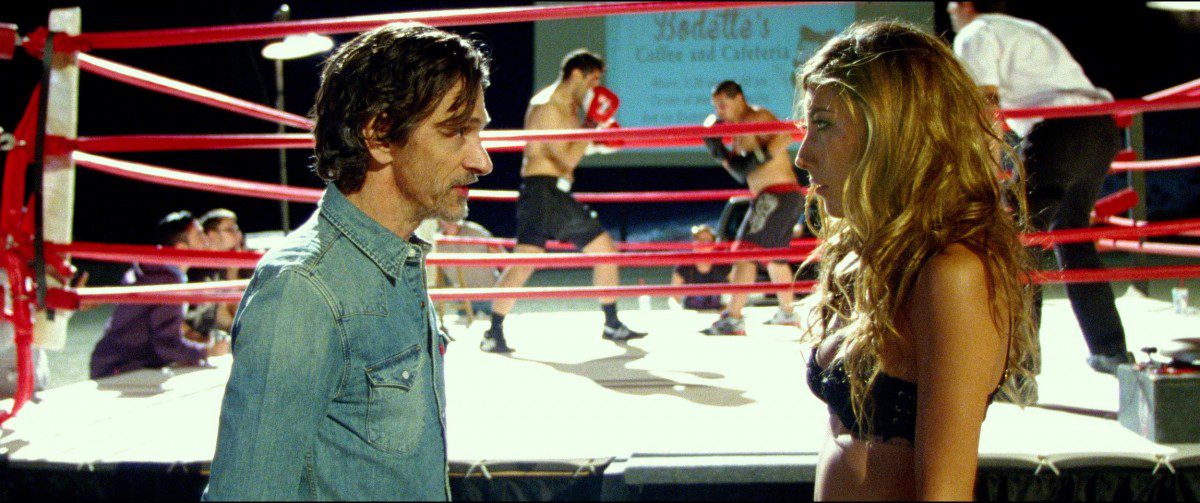This review previously ran during the 2015 Los Angeles Film Festival
Having its World Premiere at the LACMA as part of this year’s Los Angeles Film Festival, first time feature film director Dennis Hauck, along with a full cast that included lead actor John Hawkes, presented Too Late, a modern day LA-set noir on a grainy, lovely, 35mm print.
Hauck, who introduced the film with his shaggy hair and bearded scruff, looked every part the fictional companion to the film’s lead Dick, Private Investigator Mel Sampson (Hawkes), with a stringy, greased mop similar to that of Sampson’s solo-riding sleuth self.
Hauck’s lax groovy-self is clue enough to serve as a reference point in for any audience to see how the director, who also wrote the script, free-wheeled his own sensibilities into this shoot-from-the-hip noir number, which unfortunately, only supplants limitations into it. While oozing with dutiful detective homage to the likes of Raymond Chandler stories and those smoke-filled pulp noir dime-store novels, tin-thin dialogue and storytelling stands as the dividing line between audiences’ being dazzled or dismissive of this midnight flick.
If Tarantino-ringing words fill the entirety of what is spoken onscreen, than Too Late‘s non-linear storytelling cements it as a drive-in style flick that Pulp Fiction fans can readily wheel around to. However, there’s a fine line between archetypal and artificial, and Hauck, with a story centered on the disappearance of a young stripper with a heart of gold, such as the one here named Dorothy (Crystal Reed) who disappears in this seedy Angeleno world filled with equal parts high-powered murderous men, such as dirty-handed crime boss Gordy (Robert Forster) and their always scantily-clad subservients, such as icy stripper Jill (Dichen Lachman), makes this a skirting stroll around the outside edges of what might have been an even juicier crime job, if it wished to be.
And yet, the string of surrounding interstitial characters (including Rider Strong as a comic drug dealer) only exist in relation to our main PI Sampson. Hawkes, a marvel in his character work and character-fleshing, slips into Hauck’s sandbox to create a slippery yet cooly collected center of the film. Sampson dodges all of the offered and whizzing pieces that fly by, except there aren’t really a ton of flying pieces here for him to really do so, forcing Hawkes to drum up his own inner-cool on his own, which fortunately is a task that his fine actor can do in spades. Hawkes entertains even further in a moment of the film’s musical inspiration, as Sampson is urged to pick up an acoustic guitar in a closing nightclub and dilly up an impromptu cowboy-blues ballad, and at the end of a twenty minute long single-take spanning multiple mini-scenes and locations no less.
On this point: most impressive, or at least certainly most defining, is that Too Late is composed of five single-take scenes, assembled in clever order that coyly unearths more of its story with each new moment and scene. The groovy fluidity of craning and gliding cameras moves here and there, settling for a chunk of whip smart banter, and then gliding and tracking to the next composed arrangement and chunk of banter, and so-on and so forth, to give a sense of foreboding fate; as if each new in-scene movement only highlights the inevitability of what is to be revealed next, comic and tragic alike. It’s absolutely some of the finest execution in this regard, and as a result, a sense of forward-leaning audience intrigue is felt and creates the needed sense of continually rolling anticipation in its smoky facade of chilled out present-ness.
Too Late is stylishly spun in this real Southern California LA world, on Hollywood Hills cliff-hanging homes, neon-lit strip clubs, and a third act drive-in theater with a ton of visual impress. Too Late has all the cool, dress-up and homage of those delicious noir movies we love so much, even if the biggest crime committed is that it’s a little too guilty of knowing and showing it.
Too Late opens limited at the Sundance Sunset Cinemas in Los Angeles on 3/18 and in New York on 3/25, expanding across the country regionally throughout April.
Ryan Rojas
Ryan is the editorial manager of Cinemacy, which he co-runs with his older sister, Morgan. Ryan is a member of the Hollywood Critics Association. Ryan's favorite films include 2001: A Space Odyssey, The Social Network, and The Master.


